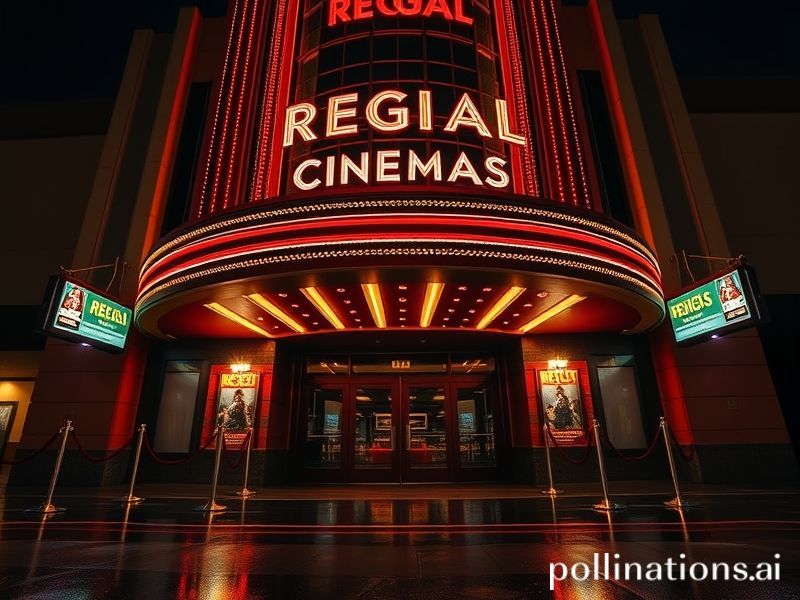Regal Cinemas: The Bankrupt Prince of Global Popcorn Empires
The Crown Jewels of Popcorn: Regal Cinemas and the Royal Mess of Post-Pandemic Leisure
From a certain angle, the neon “REGAL” sign still looks imperial—an afterglow of American soft power projected onto cracked sidewalks from Leicester Square to Louisville. Yet step inside any of its 500-odd auditoriums and you’ll find the empire has been reduced to a concession stand selling $9 vats of sugar and nostalgia. The company, owned by UK-based Cineworld until that conglomerate filed for Chapter 11 last year, is now the geopolitical equivalent of a prince-in-exile: broke, slightly hung-over, and wondering why the peasants stopped showing up.
The international plot twist is delicious. A British parent firm, leveraged to its monocled eyeballs, loaded an American theater chain with debt, then discovered that global audiences prefer binge-watching squid games in their pyjamas instead of squinting at Tom Cruise from row H. The resulting bankruptcy was less a fall from grace than a synchronized faceplant across multiple time zones. Creditors in New York argued with landlords in São Paulo while Korean creditors muttered about cross-border collateral. Somewhere in the Cayman Islands, a shell company coughed politely and changed the subject.
Regal’s plight is therefore not merely corporate gossip; it’s a cautionary fable about what happens when leisure habits mutate faster than quarterly reports. China’s Wanda Group, which once bought AMC for the cinematic equivalent of couch change, has watched domestic ticket sales rebound thanks to patriotic blockbusters and phone-sniffing AI ushers. Meanwhile, European governments slapped cultural subsidies on arthouse cinemas like truffle oil on fries, leaving American multiplexes to fend for themselves in Darwinian food courts. The message is clear: if your business model depends on selling overpriced nachos to teenagers who can stream the same film on a cracked iPhone before the credits finish rolling, you are one viral TikTok away from Chapter 22.
Still, rumors of Regal’s demise are, as Mark Twain might have said, greatly exaggerated by people shorting the stock. Bankruptcy courts are merely capitalism’s version of a royal spa retreat: you emerge thinner, tanner, and technically solvent. Expect new owners—hedge funds, Saudi sovereign wealth, or perhaps an enterprising NFT collective—to rebrand select locations as “immersive experience venues” where viewers pay extra to recline in faux-velvet seats and tweet about reclining in faux-velvet seats. The popcorn will be rebranded “artisan maize,” the cola will be “small-batch,” and the ticket price will include a QR code linking to a meditation app to calm your sticker shock.
Globally, the implications ripple outward like a poorly buttered ripple. In India, PVR-Inox executives study Regal’s Chapter 11 like medical students peering at a cadaver: “Note the leverage ratios, the rent escalations, the fatal dependence on Disney tentpoles.” In Nigeria, streaming platforms hawk low-budget comedies to smartphones, proving you don’t need Dolby Atmos when your audience commutes three hours a day in a danfo bus. Even North Korea—never one to miss an opportunity for propaganda—will doubtless claim the bankruptcy proves the decadence of Western consumerism, conveniently ignoring its own national pastime of watching middle-aged men cry in synchronized parades.
And what of the humble moviegoer? We shuffle past the empty box-office kiosks, past the motion-sensor trash cans that open like obedient courtiers, past the cardboard standee of Dwayne Johnson flexing at no one in particular. We pay the surcharges, the online convenience fees, the mysterious “facility restoration” levy that apparently keeps the ceiling from collapsing on our heads. All for the privilege of sharing armrests with strangers who treat the auditorium like their living room, complete with running commentary and illuminated phone screens. If that isn’t a metaphor for late-stage globalization—crowded, overpriced, and faintly sticky—I don’t know what is.
In the end, Regal Cinemas survives precisely because its collapse is too awkward for the world to contemplate. Nobody wants to explain to Grandma why her Thursday matinee of “Mamma Mia 17” now streams on a fridge. So the projectors will flicker again, the debt will be trimmed, and the popcorn will cost slightly less than a mortgage payment. The monarchy, battered but unbowed, will simply change the drapes and carry on. Long live the king—just don’t ask him to pick up the tab.







